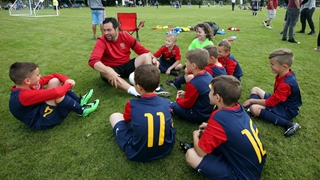
The term ‘Charter Standard’ is becoming a more familiar sight around grassroots football as more clubs and leagues strive to become fully accredited by The FA.
First introduced in 2001, the Charter Standard Programme aims to raise standards in the national game by rewarding and recognising both clubs and leagues for their commitment and achievements.
It is effectively English football’s equivalent to the Kitemark, with well-run, sustainable clubs and leagues with a commitment to quality coaching and Respect being recognised.
And as we approach Wednesday’s launch for the new FA National Game Strategy (NGS), there has been a marked increase in the number of clubs and leagues hitting the highest standards.
Four out of five youth teams across England are now signed up to play in Charter Standard Leagues, with an 85 per cent increase in clubs reaching the status since the last NGS in 2010.
Part of the criteria in order to reach Charter Standard status is that FA licensed coaches work with the players and The FA is committed to developing the quality of the coaching workforce in England.
There are now over 400,000 qualified coaches working across the nation, with 35,000 of those female.
This ethos is best summed up by Charter Standard Club of the year, AHF FC from Blackburn.
Yasir Sufi, Club Secretary, said: "It's all about taking part and making sure each and every child gets as much attention as they can to make sure they are developing as an individual."
And head coach, Zuber Patel, added: "Everything is about the kids, how can we create a better environment and opportunities for the kids of today than what we had ourselves.”
With Respect also being a key part of all Charter Standard organisations, it’s encouraging that the game is becoming more pleasant to play, with cautions for dissent at grassroots level down by 23 per cent since the Respect campaign first started seven years ago.
Of course, without referees, there would be no game at all and with one of the NGS aspirations being to have a registered and qualified official in charge of every grassroots fixture.
So with the number of active referees rising by around 15 per cent since 2009, it is further encouragement for all involved in the grassroots game.
It is worth noting that there has also been a 40 per cent rise in the number of female officials during that time, as the women’s game continues to grow.
The new National Game Strategy is revealed on Wednesday morning, when you can see the document in full and the targets set out for the next four years.










